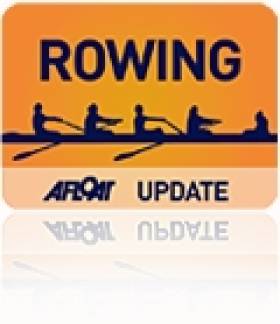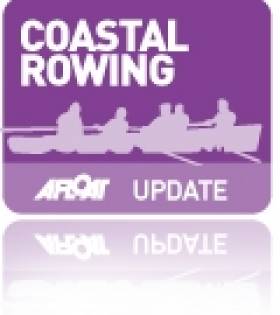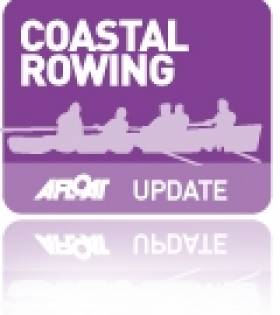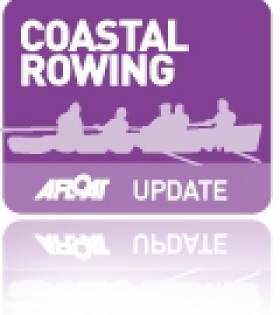Displaying items by tag: Sara G
Kelly Resting Aboard Cargo Ship After Capsize
#ROWING – Ocean rower Aodhan Kelly is travelling the opposite direction to the one he expected this morning – but he is reported to be safe and well after a tumultous 24 hours. The Dubliner and the five other men in the crew of the Sara G were hoping to set a new record for rowing across the Atlantic from Morocco to Barbados, but they capsized at 11 am yesterday 520 miles from their destination.
The six men stayed in a life-raft t until rescued by the cargo ship the Nord Taipei. The 32,000 tonne craft is continuing on to Gibraltar and is due to arrive on February 9th.
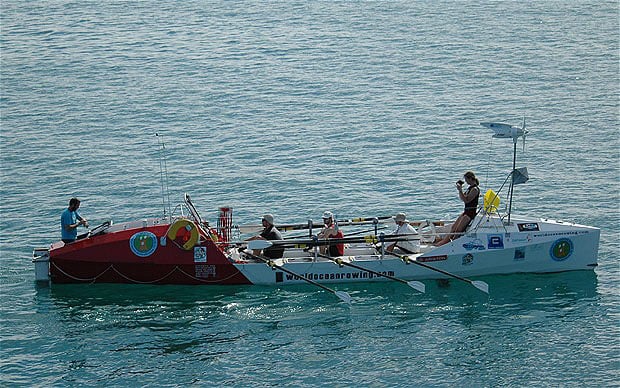
The Sara–G at the start of her now ill-fated journey
The Sara G crew, headed up by the experienced skipper Matt Craughwell, were initally hoping to break what they called the “four-minute mile” of ocean rowing by crossing the Atlantic in under 30 days. But winds and sea conditions were much tougher than expected. They had battled on bravely, with the aim of setting a new record but it all went awry on the 27th day of the row.
The present World Record is held by the 2011 crew of the Sara G - including Craughwell and Irishmen Rob Byrne and Adam Burke – who travelled from Morrocco to Barbados in 33 days 21 hours and 46 minutes in 2011. The Hallin Marine had the shortest crossing, travelling from Tenerife to Barbados in 2011 in 31 days 23 hours and 31 minutes in 2011, but because the distance is shorter the Sara G was deemed the World Record holder by the Ocean Rowing Society.
Kelly, a 26 year old from Palmerstown in Dublin, learned his rowing with Neptune rowing club in Islandbridge for whom he won eight national titles, seven junior and one intermediate. In recent years he has been living and working in Reading in England.
Irishmen Break Ocean Speed Record (and Podcast!)
The Sara G, with Irishmen Rob Byrne and Adam Burke making up a third of the crew, set a new world record today by becoming the fastest boat in the history of ocean rowing.
They rowed the long route across the Atlantic from Morocco to Barbados in 33 days 21 hours and 46 minutes, setting the fastest average speed for the crossing. Less than a day before, Hallin Marine had set a record for rowing the Atlantic east-west of 31 days 23 hours and 31 minutes, but they had crossed from the Canaries to Barbados, a shorter journey.
The Ocean Rowing Society, which is the record keeper for ocean rowing, is set to grant the Sara G the Ocean Rowing Blue Riband trophy for their row.
The crew was Matt Craughwell and Dr Graham Carlin from England, Byrne and Burke from Ireland, Thomas Cremona of Malta and Fiann Paul from
Iceland.
Listen in to a podcast from Barbados with Rob Byrne and Irish Times Rowing Correspondent Liam Gorman.
Rowers Pass Halfway Point in Atlantic Record Attempt
The Sara G and her crew are less than 1,000 miles from Barbados in their attempt to break the world record for the fastest Alantic crossing by an ocean rowing boat.
As previously reported by Afloat.ie, the six-man crew - featuring Irishmen Adam Langton Burke and Rob Byrne - set out from Morocco on 5 January.
And there is already some cause for celebration, as perfect conditions along the route so far have helped the team break another record - that of 10 consecutive days of more than 100 rowed each day.
Click HERE to track the crew's live progress across the Altantic.
Ocean Rowers Begin Atlantic Record Attempt
The crew of the Sara G have begun their latest attempt on the world record for the fastest crossing of the Atlantic by an ocean rowing boat.
The six-man crew - skippered by Sara G owner Matt Craughwell and featuring Irishmen Adam Langton Burke from Skerries and Bray native Rob Byrne - set off from Tarfaya in Morocco on Wednesday afternoon, headed for Barbados.
The 11.1m boat has a storied history, smashing the record for the fastest row across the Tasman Sea from New Zealand to Australia with its previous owner Steven Gates.
Last year the Sara G crossed the Atlantic for the first time from Agadir to Barbados in 57 days, 20 hours. This year's crew must beat a time of 38 days, 1 hour and 22 minutes to take the record held by Team La Mondiale since 2008.
Rowing southwest to take advantage of the trade winds, the Sara G is presently off the coast of north-west Africa near the Canary Islands.
Click HERE to track the crew's live progress across the Atlantic.



























